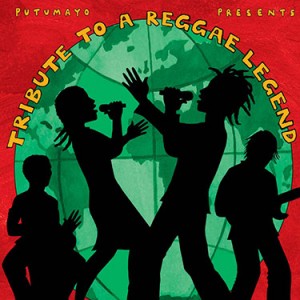Quirky Marley Tribute
Putumayo Music recently took a step away from its customary formula of regional and stylistic compilation albums to give us a tribute to the music of one man, the great reggae progenitor Bob Marley. Few people have made the kind of lasting, universal impact that Bob Marley has made with his music. In his short 36 years, Marley managed not only to introduce hundreds of millions to reggae but also spread powerful messages of peace, love, human rights and acceptance. It’s no surprise that almost 30 years after his death, one can travel to any part of the globe and witness his far-reaching musical legacy. A number of the twelve tracks were recorded specifically for this disc. But it opens strongly with something that already existed: Three Plus’s convincing “Jahwaiian” fusion version of “Is This Love.” And it remains inHawaiifor singer Robi Kahakalau’s cool, smooth take on the seldom heard “Do It Twice.”

The California band Rebelution delivers “Natural Mystic” with an authentic beat and an evocative, echo sound but, sadly, accompanied by seemingly uninspired vocals. And thin-voiced French-Canadian singer Caracol disappoints on “Could You Be Loved”—maybe it’s a style I just don’t get, but she sounds to me like a half-baked Nelly Furtado. More surprisingly, Céu also comes off strangely listless in “Concrete Jungle.” I guess you’ve either got Rasta in your blood or you don’t; it’s something that is often mimicked but not easily replicated. The Canadian band Northern Lights, on the other hand, perform a completely non-reggae version of “Waiting in Vain”, transforming it into a refreshing, acoustic folk track that listeners would have no idea was written by Marley if it was presented by itself.
Things pick up with Rocky Dawuni’s West African/island fusion sounds, and even more so when the South African Freshlyground bangs out their bright, driving Afro-fusion version of the anthem “Africa Unite,” really making the song their own, demonstrating their signature mix of African folk, kwela and jazz. And ultimately, the disc turns out to be a pretty good demonstration of how different styles can be bent and blended to adapt Marley’s hypnotic, singable, danceable songs, which are so closely identified with his own voice and sensibility. Northern Lights applies a dense American folk feel to “Waiting in Vain,” Julie Crochetière’s languid, sexy “Mellow Mood” has a vaguely European flair, and Funkadesi’s tricky rhythms and Indian/island stew form a unique style, though it didn’t totally grab me here.
The CD closes with two solid tracks. “No Woman No Cry,” from the collective calledSierra Leone’s Refugee All Stars, a group of refugees displaced toGuineaduring theSierra Leonecivil war. The group genuinely displays the heart of Marley’s “we’re all one” message. And the one-time ensemble Playing for Change is a truly international collective that unites stars like Keb’ Mo’ and Manu Chao with street musicians from all over the world. Their “One Love” makes for a beautiful good-night, a “We Are the World” without the showboating and hype. Good feelings all around. That’s the spirit of this uneven but overall quite worthwhile disc.

